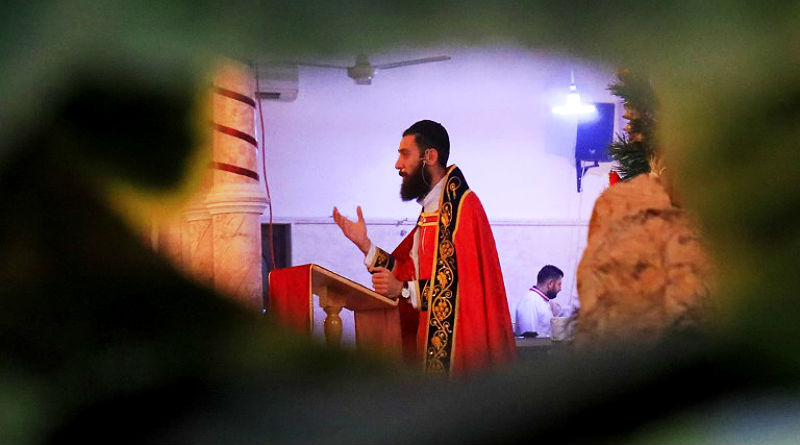A multi-religious ‘fellowship’ in Syria possible again, says church leader
Photo: A Syriac Orthodox priest preaches on Dec. 25 in Hasakah province. Delil Souleiman/AFP.
Рublication source: Syria Direct, 30.01.2018
Patriarch Benyamin I Abboud is optimistic. Born in Lebanon, the 57-year-old priest serves as head of the Unity Church, a union of Eastern rite denominations. The Church is currently advocating for the rights of Christians in Syria and other countries where Christians form minorities.
Abboud submitted a request earlier this month to the UN Security Council to open an investigation into war crimes against Syrian Christians, and to “establish a special court” for trying those crimes.
Among the rights abuses Abboud helps document are “kidnapping, forced disappearance and arbitrary detention” of Christians across Syria, he tells Syria Direct’s Ammar Hammou from Brussels, where the Unity Church is headquartered.
Abboud declined to say which exact parties he holds accountable for targeting Christian communities in Syria, though Christians have been jailed, killed or displaced by both the Syrian government and armed groups.

In Qaryatayn, one formerly mixed-religion town in Homs province that Syria Direct reported on last year, all Christians are gone after two Islamic State invasions and the kidnapping of the local priest and Christian residents. The town’s ancient St. Elian Monastery sits in ruins.
Qaryatayn is not alone. Abboud says thousands of Syria’s estimated 1.7 million Christians fled the country since the start of the war nearly seven years ago.
“My heart is squeezed in pain amid the policies that are making Christians depart,” Abboud says.
But despite the losses and human rights abuses, Abboud wants to bring to justice, and memories of prior coexistence give him hope that a post-war Syria can be home to all its religious groups.
“The first word will be ‘Syrian,’ no matter what someone’s religion is.”
Q: You recently requested the UN Secretary General open an international investigation into violations in Syria, especially against Christians. Could you talk more about those violations?
I’ve classified these violations as follows: kidnapping, forced disappearance, detainment, arbitrary detention, embezzlement, rape, slavery and sale of women and girls in public auctions, physical and psychological torture, and finally, genocide.
The goal of our request to the international judiciary is to establish a special court after the end of the investigations that we requested.
In the interest of preserving the confidentiality and the safety of those killed, and those who worked to document these crimes and violations mentioned above, the answer to the second part of your question will be left until after the international investigations.
Q: Do you have documentation of the crimes and violations that were wrought against the Syrian Christians? Have you faced any backlash?
The attempt to assassinate me in 2016 was not a coincidence. The price of documenting these crimes and violations that were wrought on the Christians of Syria and Iraq was my blood.
[Ed.: Three “armed men” attempted to kill Abboud at his rectory in Brussels in 2016, the Assyrian Monitor for Human Rights reported at the time.]
Q: Are you noticing any real assistance from UN member states or from the West toward Syrian Christians?
In the beginning, we didn’t find any assistance from Western countries for Christians to take refuge there. In addition, there was a lack of real support for those who are still living in their homelands, while these countries have offered support to various extremist groups.
But the Christians [of the West] are not necessarily aligned with the Christians of the East.
A Syriac Orthodox priest preaches on Dec. 25 in Hasakah province. Delil Souleiman/AFP.
Seeing as the Christians are oppressed and divided, it appears that the burden is placed on them. We blame the big countries in the world that decided to empty the East of its Christians and to cooperate with the local and regional parties. The countries that publicize that they support Christians in fact expose them to all of the pain and persecution that the Eastern Christians suffer from daily, including crimes of genocide.
My heart is squeezed in pain amid the continuation of these international, regional and local policies that are making Christians depart.
Q: The term “minorities” was not used in Syria before the war. Indeed, Syria was a mosaic of Christians, Muslims and others from different sects and ethnicities. Today, sectarian and ethnic lines are being played on—what are you doing to mend the fractures that are tearing apart Syrians?
In reality, the term “minorities” was not used in Syria before the war in the way that we are seeing it today. That is [part of] the crisis of Syrian national identity. If this crisis is solved, then Syrians can have pride in this identity and restore it so that there can be fellowship and familiarity among all of the various cultural and religious groups in the country. Syria can be a homeland for all Syrians.
I believe that the [sectarian] tension will not remain—rather, the opposite: there will be a national homeland for Syrians without ‘minorities’ or ‘majorities.’
The first and final word will be ‘Syrian,’ no matter what someone’s religion or ethnicity is.

